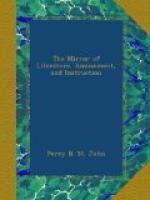and a very excellent foreman of a grand jury.
He died one evening while laughing at a story which
he had heard regularly thrice a week for the last
fifteen years of his life, and his spirit mingled with
the claret. In former times when the De Lacys
were buried, there was a grand breakfast, and all
the party rode over to the church to see the last
rites paid. The keeners lamented; the country
people had a wake before the funeral, and a dinner
after it—and there was an end. But
with the march of mind comes trouble and vexation.
A man has now-a-days no certainty of quietness in
his coffin—unless it be a patent one.
He is laid down in the grave, and the next morning
finds himself called upon to demonstrate an interesting
fact! No one, I believe, admires this ceremony,
and it is not to be wondered at that Sir Theodore De
Lacy held it in especial horror. “I’d
like,” said he one evening, “to catch one
of the thieves coming after me when I’m dead—By
the God of War, I’d break every bone in his
body;—but,” he added with a sigh,
“as I suppose I’ll not be able to take
my own part then, upon you I leave it, Larry Sweeney,
to watch me three days and three nights after they
plant me under the sod. There’s Doctor
Dickenson there, I see the fellow looking at me—fill
your glass, Doctor—here’s your health!
and shoot him, Larry, do you hear, shoot the Doctor
like a cock, if he ever comes stirring up my poor old
bones from their roost of Inistubber.” “Why,
then,” Larry answered, accepting the glass which
followed this command, “long life to both your
honours; and it’s I that would like to be putting
a bullet into Doctor Dickenson—heaven between
him and harm—for hauling your honour away,
as if you was a horse’s head, to a bonfire.
There’s nothing, I ’shure you, gintlemin,
poor as I am, that would give me greater pleasure.”
“We feel obliged, Larry” said Sir Theodore,
“for your good wishes.” “Is
it I pull you out of the grave, indeed!” continued
the whipper-in, for such he was, —“I’d
let nobody pull your honour out of any place, saving
’twas purgatory; and out of that I’d pull
you myself, if I saw you going there.”
“I am of opinion, Larry,” said Doctor Dickenson,
“you would turn tail if you saw Sir Theodore
on that road. You might go further, and fare
worse, you know.” “Turn tail!”
replied Larry, “it is I that wouldn’t—I
appale to St. Patrick himself over beyond”—pointing
to a picture of the Prime Saint of Ireland, which
hung in gilt daubery behind his master’s chair,
right opposite to him. To Larry’s horror
and astonishment, the picture fixing its eyes upon
him, winked with the most knowing air, as if acknowledging
the appeal. “What makes you turn so white
then at the very thought,” said the doctor, interpreting
the visible consternation of our hero in his own way.
“Nothing particular,” answered Larry;
“but a wakeness has come strong over me, gintlemin,
and if you’d have no objection, I’d like
to go into the air for a bit.” Leave was




